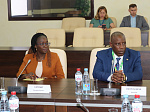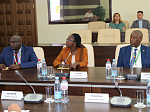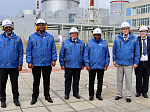27.07.2023
INFORMATION AND PUBLIC RELATIONS DEPARTMENT OF LENINGRAD NPP
The President of the Republic of Burundi got acquainted with the advanced Russian nuclear technologies at the Leningrad NPP
On July 26, 2023, a delegation of the Republic of Burundi headed by the President of the country, Evariste Ndayishimiye, visited the Leningrad Nuclear Power Plant for the first time and assessed the high level of development of the Russian nuclear industry. The visit took place as part of the second summit of the Russia-Africa Economic and Humanitarian Forum, which is taking place these days in St. Petersburg. The President of Burundi, together with Minister of Foreign Affairs and Cooperation Albert Shingiro, Minister of Water Resources, Energy and Mining Ibrahim Uwizeye met with the leadership of Rosatom and the Leningrad Nuclear Power Plant, and visited the site of PWR-1200 power units.
Ambassador Extraordinary and Plenipotentiary of the Russian Federation to the Republic of Burundi Valery Mikhailov explained: “The intergovernmental agreement between Russia and the Republic of Burundi will create a solid basis for the development of cooperation between Russia and Burundi in the high-tech nuclear sector. It will allow us to start agreeing on a roadmap for the implementation of our ambitious plans. A tour of the Leningrad nuclear power plant will allow the President to get an idea of how such a facility functions and start taking real actions that will allow Burundi to become one of the leading countries in terms of energy supply in Africa.”
Chief Engineer of LNPP-2 Alexander Belyaev conducted a sightseeing tour of the territory. At the block control room of the power unit and in the turbine hall, he spoke about the unique safety systems implemented in the PWR-1200 project. Compared to traditional power units of the same type, the project has advantages that significantly increase its economic performance and safety. Thus, the capacity of the reactor plant has increased by 20% compared to the previous generation, the design service life of the main equipment has been doubled and is 60 years with the possibility of extension for another 20 years. The main feature of the PWR-1200 design is a unique combination of active and passive safety systems that make the plant as resistant to external and internal impacts as possible.
After the excursion, the Minister of Water Resources, Energy and Mining of Burundi, Ibrahim Uwizeye, shared his impressions: “In our country, the most important national project Burundi-2040 is now being implemented. Its goal is to lead our country to energy security and independence with the consumption of different types of energy within the country. Therefore, acquaintance with the Leningrad NPP in the perspective of the implementation of this national program is extremely useful. Now we are concentrating on the training of energy specialists with higher education who will be involved in the development of this industry.”
Today, the State Corporation Rosatom is implementing a large-scale program for the construction of nuclear power plants both in Russia and abroad. Today, Rosatom ranks first in the world in terms of export of nuclear power plant construction and is building 23 power units in 8 countries. In order to create technological sovereignty and improve the level of energy security of African countries, the state corporation offers them low-power nuclear power plant projects, guaranteeing the construction of nuclear power units on a turnkey basis, the supply of nuclear fuel for them, training of operating and maintenance personnel, support for operation, maintenance and modernization, etc. Foreign partners will be included in all technological chains implemented by Russia.
Providing access to affordable and clean energy for any country in the world is one of the United Nations sustainable development goals pursued by Rosatom. Besides, the Russian State Atomic Energy Corporation actively supports other UN goals: Rosatom invests forces and funds in the development of nuclear cities and their infrastructure, provides its employees with decently paid jobs, professes the principles of respect for the environment, develops high-tech products to maintain health people and increase the efficiency of agriculture, etc. Thanks to Rosatom, in countries that are just embarking on the path of developing nuclear energy, centers of nuclear science and technology are beginning to be created. To date, such centers are planned to be built and opened in two African countries (Rwanda and Zambia), as well as Vietnam, Bolivia and Serbia. Partner countries will receive research nuclear reactors and a number of modern laboratories for the production of radioisotopes for use in medicine, industry, and agriculture.
Ambassador Extraordinary and Plenipotentiary of the Russian Federation to the Republic of Burundi Valery Mikhailov explained: “The intergovernmental agreement between Russia and the Republic of Burundi will create a solid basis for the development of cooperation between Russia and Burundi in the high-tech nuclear sector. It will allow us to start agreeing on a roadmap for the implementation of our ambitious plans. A tour of the Leningrad nuclear power plant will allow the President to get an idea of how such a facility functions and start taking real actions that will allow Burundi to become one of the leading countries in terms of energy supply in Africa.”
Chief Engineer of LNPP-2 Alexander Belyaev conducted a sightseeing tour of the territory. At the block control room of the power unit and in the turbine hall, he spoke about the unique safety systems implemented in the PWR-1200 project. Compared to traditional power units of the same type, the project has advantages that significantly increase its economic performance and safety. Thus, the capacity of the reactor plant has increased by 20% compared to the previous generation, the design service life of the main equipment has been doubled and is 60 years with the possibility of extension for another 20 years. The main feature of the PWR-1200 design is a unique combination of active and passive safety systems that make the plant as resistant to external and internal impacts as possible.
After the excursion, the Minister of Water Resources, Energy and Mining of Burundi, Ibrahim Uwizeye, shared his impressions: “In our country, the most important national project Burundi-2040 is now being implemented. Its goal is to lead our country to energy security and independence with the consumption of different types of energy within the country. Therefore, acquaintance with the Leningrad NPP in the perspective of the implementation of this national program is extremely useful. Now we are concentrating on the training of energy specialists with higher education who will be involved in the development of this industry.”
Today, the State Corporation Rosatom is implementing a large-scale program for the construction of nuclear power plants both in Russia and abroad. Today, Rosatom ranks first in the world in terms of export of nuclear power plant construction and is building 23 power units in 8 countries. In order to create technological sovereignty and improve the level of energy security of African countries, the state corporation offers them low-power nuclear power plant projects, guaranteeing the construction of nuclear power units on a turnkey basis, the supply of nuclear fuel for them, training of operating and maintenance personnel, support for operation, maintenance and modernization, etc. Foreign partners will be included in all technological chains implemented by Russia.
Providing access to affordable and clean energy for any country in the world is one of the United Nations sustainable development goals pursued by Rosatom. Besides, the Russian State Atomic Energy Corporation actively supports other UN goals: Rosatom invests forces and funds in the development of nuclear cities and their infrastructure, provides its employees with decently paid jobs, professes the principles of respect for the environment, develops high-tech products to maintain health people and increase the efficiency of agriculture, etc. Thanks to Rosatom, in countries that are just embarking on the path of developing nuclear energy, centers of nuclear science and technology are beginning to be created. To date, such centers are planned to be built and opened in two African countries (Rwanda and Zambia), as well as Vietnam, Bolivia and Serbia. Partner countries will receive research nuclear reactors and a number of modern laboratories for the production of radioisotopes for use in medicine, industry, and agriculture.





 career
career Innovations
Innovations Projects
Projects INTERNATIONAL BUSINESS
INTERNATIONAL BUSINESS